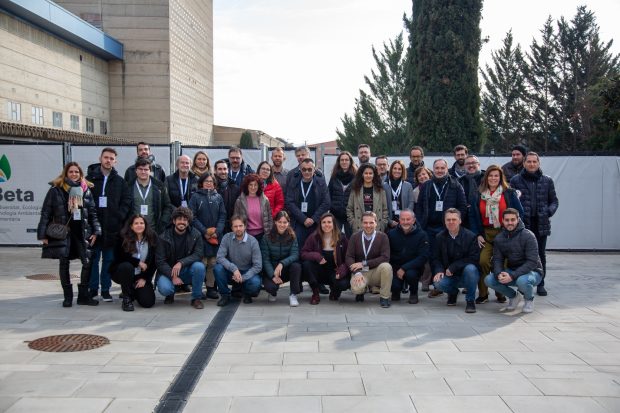FOLOU will position Catalonia as a European benchmark in the reduction of food wastage
The project will develop new methodologies and tools to reduce food losses and food waste in the primary sector

Catalonia has been working for years to prevent food losses and food waste through the Department of Climate Action, Food and Rural Agenda (DAAC) and the Catalan Waste Agency (ARC). In fact, Catalonia is the first region in Europe with a specific regulation: Law 3/2020. This regulation is a pioneer in defining and incorporating food losses that occur in primary production into the prevention and sustainability policies of the food chain and in involving its operators. In this line, one of the objectives of the European FOLOU project, coordinated by the BETA Technology Centre, is to gather the experience accumulated so far and add the new knowledge that will be generated with the pilot tests and case studies of the new project. In this way, Catalonia will position itself as a European benchmark in the development of strategies to reduce food losses and food waste in the primary sector.
The launch meeting of the FOLOU project, which has the prominent participation of the DAAC and the ARC, was held this afternoon at the facilities of the CT BETA. The presentation of the project was attended by Joan Gòdia, director general of Food Companies, Quality and Gastronomy of the Generalitat de Catalunya; Josep Eladi Baños, rector of the UVic-UCC; Sergio Ponsá, director of CT BETA, and Isaac Peraire, director of the Waste Agency of Catalonia, among others.
Baños welcomed all the attendees and commented that “an essential task of universities is to accompany society in solving its most urgent needs”. In a context of diverse crises such as overpopulation, global warming, an increasingly extreme climate and the energy crisis, “we will agree that the fight against food waste, the central axis of the FOLOU project, must be a priority”, he said. The rector also stressed that the BETA TC represents the type of research that UVic-UCC wants to carry out, “with international vision and vocation, innovative, applied and conscious, and that provides solutions to real problems”.
Ponsá made a presentation of CT BETA to the audience, in which he highlighted the main areas in which it works and pointed out the importance “that research can end up having an impact on society”. Focusing on the FOLOU project, Ponsá highlighted the consequences of food waste from an economic, social and environmental point of view. In this sense, he added: “We must develop new methodologies and tools that help us to quantify food waste and, at the same time, study how to implement them”.
Gòdia, for his part, highlighted the work that the Department of Climate Action, Food and Rural Agenda has been doing for years in the field of food losses and food waste. He gave as examples the Law 3/2020, with which “Catalonia is a pioneer in the prevention of food waste in the primary sector” and the Strategic Food Plan of Catalonia, which has contributed “to making Catalonia a sustainable country”.
Knowledge transfer between regions
The FOLOU project, which will develop new methodologies and tools to reduce food losses and food waste in the primary sector, will work actively to transfer Catalonia’s experience to other regions that need to design new methodologies to measure their own food waste that are adapted to their realities. In the long term, the transfer of knowledge between regions and towards European institutions “should make it possible to harmonise the method for calculating food waste between different countries and to have better national and European data records”, explained Joan Colón, principal investigator of the BETA TC in the FOLOU project.
In this sense, the European Commission has already established a common method and minimum requirements to reduce the amount of food waste at national level. However, this is still a very general approach, which does not include all the particularities that influence the phenomenon of food waste. The FOLOU project therefore hopes to help address the urgent need to develop new methods to estimate the magnitude of losses caused by food waste and to implement efficient short-term measures to help reduce it. “Food waste has a negative impact on society on many levels, causes food insecurity and generates environmental impacts of all kinds,” said Joan Colón. These impacts can include unnecessary greenhouse gas emissions, waste of water resources and degradation of some ecosystems and their biodiversity.
Image recognition or artificial intelligence
The FOLOU project will have a technological aspect. “We hope to validate the use of six technologies applied in an innovative way to the control of food waste, such as image recognition systems or artificial intelligence,” Colón explained. As an outstanding result, FOLOU will create a new sustainability assessment tool that will enable efficient, standardised and reliable quantification of the environmental, economic and social impacts derived from food waste, in order to identify which stages of the value chain should be acted upon.
The main focus of the project will be on the primary production stage, which is the most difficult to monitor, given that with current technical resources it is very time-consuming and costly. This stage mainly includes agricultural activities, aquaculture, fisheries and other primary sector activities, where many of the food losses occur before the product is marketed, as well as in the handling and storage process. The World Wildlife Foundation estimates that, in the primary sector alone, the global figure for food waste may be as high as 1.2 billion tonnes per year.
The FOLOU project, funded by the European Commission’s Horizon Europe programme, will work to ensure the adoption of the project’s results by all key stakeholders: primary producers, retailers, consumers, policy makers and researchers. 7 million and an international consortium of 16 partners will be involved. Apart from the participation of the Department of Climate Action, Food and Rural Agenda, and the Waste Agency of Catalonia, the Espigoladors Foundation will also take part.
